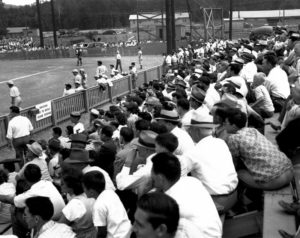
Baseball Game Oak Ridge 1945. Pro722 DOE photo Ed Westcott 6-17-1945 Army Cards vs Moore General Hospital Oakwood Park Oak Ridge Tennessee.
I started collecting baseball and football cards back in the late 1940s. Fortunately, my parents did not throw them all out when I went to college. In the 50’s my brother and I used to comb all the mom and pop corner stores in Cleveland Heights Ohio looking for the latest release from Bowman and eventually Topps. I still maintain my interest in these classics and enjoyed the Wall Street Journal’s recent feature, which I have abstracted for you below.
Dan Weil writes at The Wall Street Journal (abridged):
Three years ago, Simon Brown, a 36-year-old public-relations professional in Washington, D.C., purchased a 1938 Joe DiMaggio baseball card for $1,500. Its value now: $2,500, up about two-thirds, based on sales records for comparable cards, he says.
Baby boomers are the foundation of the market because of the wealth they’ve amassed as a group during their careers. “They have huge buying power and nostalgia for sports memorabilia, such as baseball cards.
Baseball cards, which originated in the 1860s, remain a staple. Cards prior to 1960 have particularly escalated in value. “A handful of old cards have reached iconic status, such as Honus Wagner cards from 1909-11 and Mickey Mantle cards from 1952,” says Mr. Brown, the collector.
In May, one of those Wagner cards sold for $1.2 million, up 54% from its sale price of $776,750 in 2016 and 83% from its sale price of $657,250 in 2014, according to SCP Auctions, a sports-memorabilia specialist based in Laguna Niguel, Calif.
So how can buyers, especially novices, avoid overpaying in this inflationary environment? Homework is essential. Buyers can do significant price research with an internet search of dealers, auction houses, appraisers and even eBay
Buyers also should research the seller. “Know what it is you’re buying and from whom you’re buying it,” says Steve Sloan, president of Professional Sports Authenticator, which grades and authenticates sports memorabilia. “You should only purchase pieces from a reputable dealer that has been in business for at least five years,” he says. Independent, third-party certification of an item’s authenticity is also important, experts say. Authenticators besides PSA include James Spence Authentication and Beckett Authentication Services. A knowledgeable adviser also might help new collectors avoid costly rookie mistakes.
Mr. Weil is a writer in West Palm Beach, Fla. He can be reached at reports@wsj.com.
Read more here.
If you’re willing to fight for Main Street America, click here to sign up for my free weekly email.




